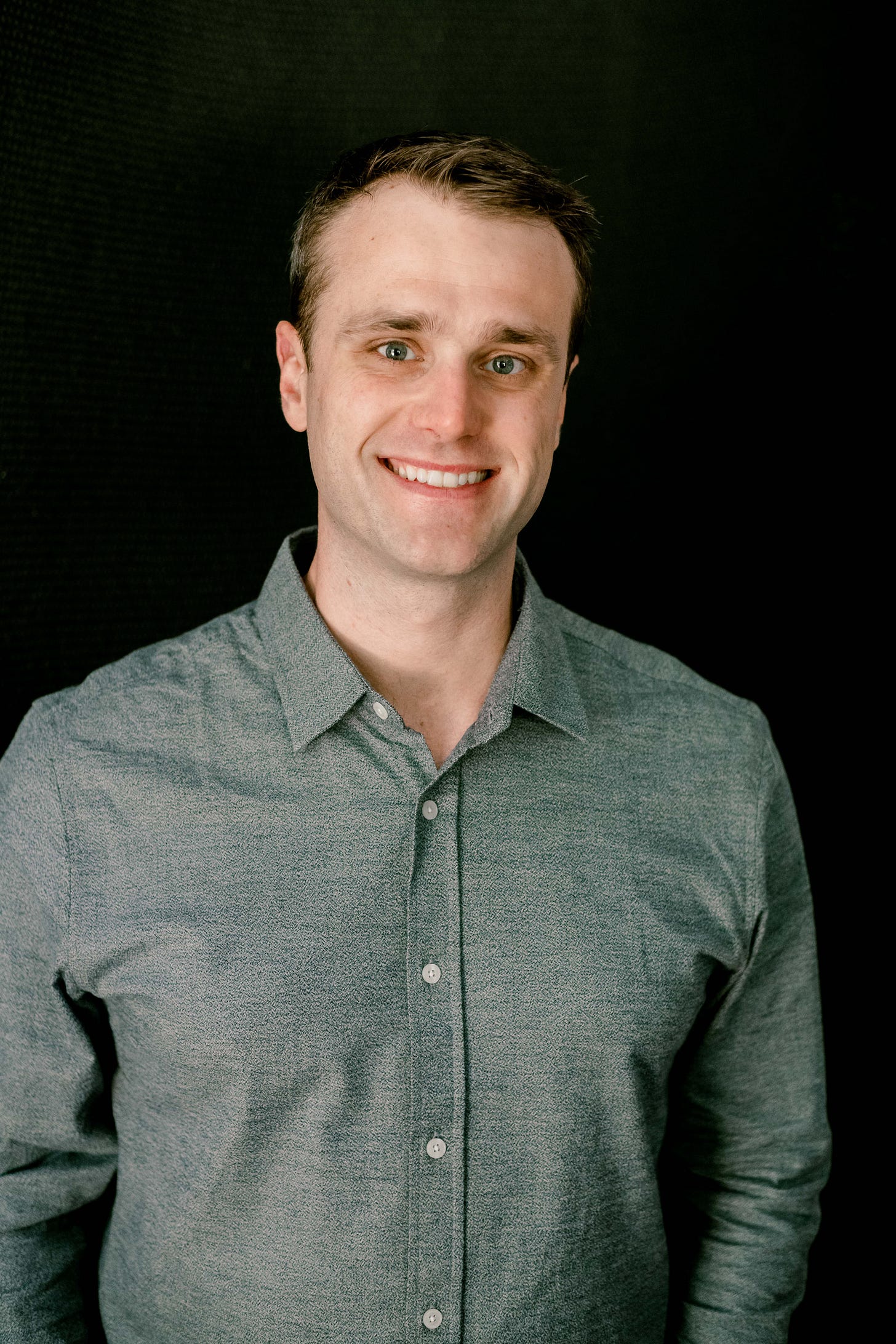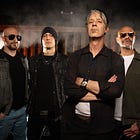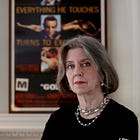CR 036: Corey Frost on Shaping Narratives from the Edit Bay
The Emmy Award-nominated editor discusses his transition from sports documentaries to the scripted feature “Grace Point.”
Director Joe Dante reportedly once said that “editing is where movies are made or broken. Many a film has been saved and many a film has been ruined in the editing room.” Corey Frost knows this all too well. For over a decade he has used his skills as an editor to shape dozens of emotionally-charged sports documentaries, including Netflix’s Coach Snoop, TNT’s Shaq Life, Peacock’s Joe Montana: Cool Under Pressure, and the UFC 25 Years in Short docuseries, which earned him a Sports Emmy nomination. In recent years, he’s transitioned from working on sports docs to scripted features, showcasing his talents on the gripping drama Grace Point (starring Andrew McCarthy and John Owen Lowe), which was recently released on streaming platforms. He’s currently working on the scripted-documentary hybrid New Here, an exploration of the Cryptoart movement.
Frost says that working on a wide range of productions isn’t just a goal; it’s a critical component to career longevity. “I’ve molded myself to be this Swiss Army Knife of an editor,” he says. “The jack-of-all-trades is looked down upon, but if you know more about your craft—the sound, the color, the camera, the directing—as an editor, that’s invaluable. And every project that I take, I want to get more information from those crafts. That will make me a better editor long-term.”
Over a recent Zoom call from his home in North Carolina, Frost spoke with me about AI, imposter syndrome, and his advice for anyone aiming to work in post-production.
SANDRA EBEJER: I talk to a lot of actors and authors, and many of them say they knew from a young age that they wanted to embark on an artistic career. But you don’t hear too many kids saying, “I want to work in post-production when I grow up.” So, how did your love for editing begin?
COREY FROST: Yeah, it’s interesting. I feel like [while watching] the Oscars, a lot of people were saying, “My family introduced me to these films and the cinema.” I didn’t have that. I had a lot of music in my family. My great-grandmother had a piano, and she would teach us as kids growing up to try to get us to latch onto it. I remember that our family told stories of how she used to play in silent films, and she would be live in the theater. So I always say that music was my gateway into post-production, in a sense. One of the big influences that I saw [when I was] young was Baz Luhrmann’s Romeo + Juliet. It was so unique. I felt like the editor took center stage and that always stayed with me.
I pursued music, and I learned this idea of creating emotion in music. And then I realized you can do both as an editor. You can bring these two things together and shape how people feel. I was a really shy kid, and I found that film editing could give you an outlet to express yourself in a way that I don’t think directing or being an actor can do. You marry all these pieces together and it creates the magic. Movie magic is made in the edit room and that’s where I want to be. I want to be at the central part of that.
What led you to documentary films specifically?
My career has always been this random hodgepodge of decision making. I went to film school at UCF in Orlando, and I was writing and directing. I was like, “I’m going to go to Hollywood! I’m going to be a director.” And then a professor challenged us to make a doc and tell a personal story, and that, for me, was very abnormal. I didn’t want to reveal internal feelings. I made a film about my grandfather and his identical twin brother and this relationship that was fractured, and it allowed me to challenge myself to tell a story that was very personal, and to find meaning, find this idea of what life is really about, and find empathy towards other people. This was a whole other part of filmmaking I never thought I could be in. I just thought it was either Hollywood or nothing.
From there, I got a job at NFL Films, and I went down this path of docs, exploring real stories, first in sports, but then transitioning into more emotional stories through sports and this idea that inside of a sport there are these microcosms of storytelling that you can be a part of. In the back of my mind I always wanted to do scripted but there was a power to docs that I just couldn’t resist, just telling real people’s stories.
You’ve edited many sports documentaries, as well as a feature narrative, Grace Point, and you’re now working on a scripted-documentary hybrid, New Here. These are all wildly different projects. At this stage of your career, how do you decide which films to take on? What does a project have to have in order for you to want to spend time working on it?
It’s got to challenge me as a creative. That’s why you see this vast range of films and shorts and projects. I always want to learn something and take something away from every project I do, whether that’s a technical skill or a storytelling skill. For a lot of years, I was just going through the motions. I wanted to make a change, and Grace Point really did that. Jumping into a scripted format, after almost 15 years of documentary and sports television, allowed me to slow down and see the craft. For years, it was all about, “How fast can we put this segment on television?” There was not a lot of decision making in terms of, “This actor is making this emotion.” It was all about speed and deadlines. And going into a scripted format, I got to understand craft and see emotions play out. That was what Grace Point did for me. I’m always looking for a new challenge.
Was it difficult transitioning from the documentary world to your first scripted feature?
Storytelling is universal. I know how to tell a story and tell it well, but the nuances between doc editing and scripted editing are so subtle that I think I was a little naive going into it. I’m like, “This scene’s gonna be easy! This moment is going to play out exactly how it is, and my editor’s cut is going to be the cut.” A lot of the time, as an editor, you have to get out of the way for a good performance. You can’t just cut to cut. You have to let an emotion build in an actor’s performance. The biggest lesson that I learned on Grace Point is slowing things down, letting things play out, letting a shot hold—that also inherently builds tension for audiences. And you can see things playing out in an actor’s face, versus trying to force and hand-hold the audience along the way. That was the biggest challenge, to get used to that and slow it down. Because, like I said, for years, it was always about the deadline. It was always about the speed. [Grace Point] allowed me to see performance and shape it. I think those are the biggest differences. The ability to shape performance and slow down in scripted was definitely something I needed to hone a bit more.
Given that Grace Point was the first scripted feature that you’ve edited, did you feel any added pressure or imposter syndrome while working on the project?
Imposter syndrome is very much alive in my brain. [Laughs] It’s a parasite that I can’t get rid of. I assume most filmmakers have that same feeling. But I didn’t feel pressure, because coming from a doc perspective allowed me to have this creative ability to shape things differently. Grace Point is an indie; it was shot for under a million dollars. There were logistical things that the schedule didn’t allow them to shoot, or they just didn’t get time to film. As a documentary editor, your job is to shape a film from what you get. Coming from that side of it, going into a scripted, it felt easier to do that stuff, to cheat things and to move things around and play, whereas maybe a scripted filmmaker going into docs might not have that ability because they’re more used to structure.
I never really relied on the script in Grace Point. I referenced it, but I used the footage and I used my storytelling instincts coming from documentaries to solve problems and to find the cracks creatively. There was a shot where Brandon, our lead character, would go to the edge of a sand dune. This wasn’t originally planned to be any kind of visual effects shot, but I told Rory [Karpf], our director, “This shot doesn’t have big enough stakes. You can see the end. And everyone I’ve shown it to—my wife, my friends—are like, ‘Why don’t the bad guys just walk down the sand and chase them?’” So I devised this idea to make it a VFX shot and build this empty pit way down below. As a documentary filmmaker, that’s how I’m thinking: How do we make the impact even bigger for every single shot possible? That was a really fun experience to be able to do on a scripted project, versus a doc, where I feel like I’m more put in a box with what I get.
When you watch a film or TV show, something you haven’t personally worked on, do you find yourself paying attention or noticing things that only an editor would notice? And are there any films or shows where you thought, “That was a really cool cut”?
I try not to, because then I’ll just get sucked into it. But I do find myself falling down the rabbit hole. You know, they say editing is the invisible art and if you’re doing it well, the audience doesn’t know it. And I agree. But I also think there are a lot of new films and television shows where the editing really shines. Severance has done an amazing job with the editing. If you’re noticing the small, minute details, the filmmaker probably didn’t do a great enough job to mask them and get you engrossed in the story, but as an editor, I can also appreciate a tough edit.
There are so many big changes affecting creative industries today—AI is infiltrating our lives; people can make and edit movies on their phone. Are there any trends happening that excite you or concern you about your industry?
All the above. The AI conversation is a difficult one. The technology is rapidly outpacing what we would have imagined. There are some exciting tools that allow you to open up your freedom of creating art. Those tools I welcome—the ability to take mundane tasks and move them out of the way so that we can focus on creating stories. The tools that aren’t as exciting are the ones that strip the ability for artists to get compensated. And I think it’s all about who has them. If some tech giant has the ability to wipe hundreds of thousands of jobs off the planet for a profit, they might do that. But if a creative, an artist, gets the power of an AI tool that allows them to create art, that’s different. I think it is this thread of balancing what makes us human—empathy, love, emotion. Those things AI can never reproduce, as much as they try. I think if artists can have the ability to blend the two, the future is bright. If the tech bros and the tech giants just want to get a bottom line, that’s when we’re a little bit in a gray area of the doom and gloom of AI.
What is your advice to those who are interested in a career in post-production?
Have patience. Filmmaking is so much about decisions in your life, not only personal, but also in our career path, and those decisions really take you on this wave. You can’t come out of film school or college, edit a couple short films, and expect that your career is going to take off. It requires a lot of patience and life experience. There is so much about life that a 25-year-old doesn’t know. When I was 25, I probably wouldn’t make the same film that I make now at 37. I had a kid. I’ve had multiple friends and family pass away. Those things all get put back into art. So understand that it’s going to be a while, maybe, before you get your big break or that it’s going to be more difficult for you to tell a story at 25 that needs that nuance.
Then, specifically, create your own map. If you want to edit a Hollywood film, the next Marvel, or the next indie Anora, find ways to get there. Write down on a piece of paper, “This is where I want to be: editor of a film like Anora,” and then make a ladder of the different avenues [to get there]. Sometimes they’re lateral. There are different avenues into each position. So maybe it’s a post-production PA [production assistant], then post PA leads to assistant editor. And maybe assistant editor leads you to a doc, but then docs lead you to an edit position. It’s this web that creates a road map, and I think that has helped me over the years. Especially not being in L.A., not being in New York, I’m always having to reinvent myself to compete and get work in those markets. So having a map and understanding the hierarchy of how you get there, I think that’s really important for young editors to understand.
As a filmmaker, especially an editor, you always feel alone. You’re always holed up in a dark room, sometimes with a director, sometimes not. You’re on your own, and you’re sitting there with your own feelings. And the biggest thing that has helped me as a filmmaker is to find a community that I can bond with. New Here, the film that I’m on now, allowed me to find that. I found it through social media; I found it through going to events. So another piece of advice: [there’s] this community of people out there that really want you to succeed. I think [it’s important] for younger filmmakers to reach out and find community wherever you can, the people doing the things that you want to be doing, and build relationships, because they carry you throughout your career.
You’ve amassed so many great credits, you’ve been nominated for an Emmy Award, and you’re editing a variety of projects. What are some things that you haven’t done yet that you’d still like to accomplish?
It’s really about telling stories that resonate personally. Finding a project that I can engross my personal feelings and all of my life experience into, that is what I’m seeking long-term. It’s hard to pinpoint a specific [answer to], “What would you want that you haven’t accomplished?” I feel like every project I take, I want to make sure that I have more choice into taking this story because it means something to me. That’s what I want to do. I want to be able to say, “I don’t want these projects, because this one right here really speaks to me.” Having more choice in projects is really something I look forward to.
To learn more about Corey Frost, visit his website.
This interview has been edited for clarity and length.
You might also enjoy…








